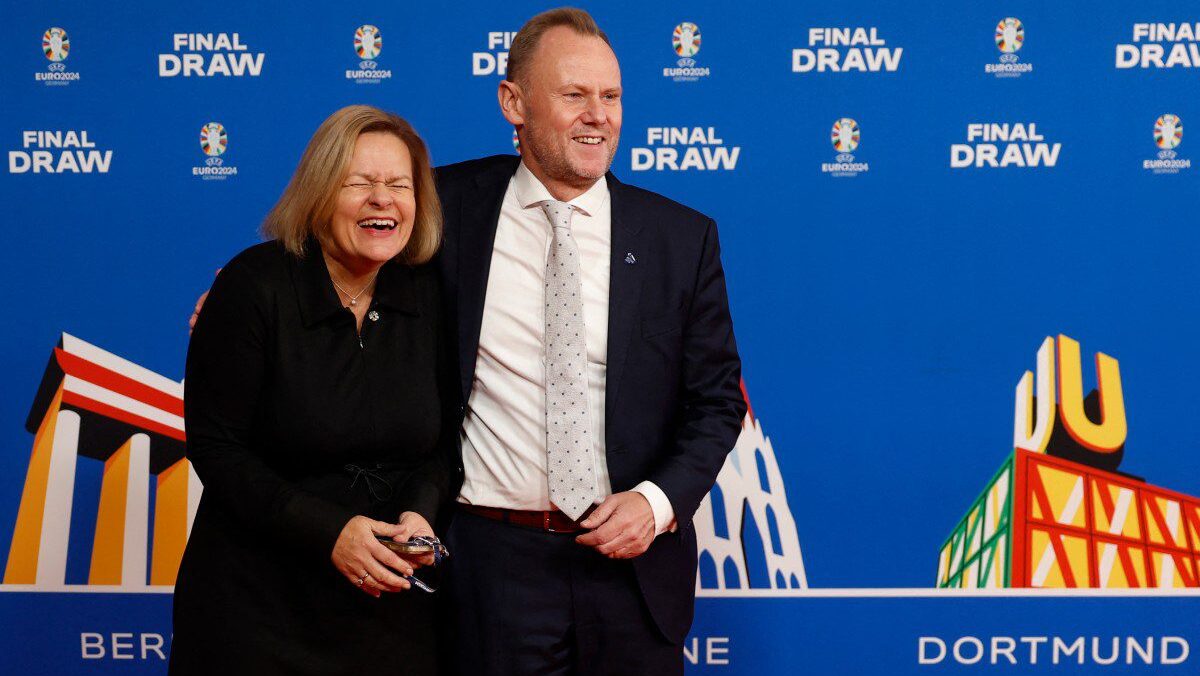
German Interior Minister Nancy Faeser (L) and Hamburg’s Interior Senator Andy Grote pose on the red carpet upon arrival for the final draw for the UEFA Euro 2024 European Championship football competition in Hamburg, northern Germany on December 2, 2023.
Photo: Odd ANDERSEN / AFP
Germany’s interior minister called on German companies to “take a clear stance” against and de facto boycott the ascendant Alternative für Deutschland (AfD), prompting sharp criticism from the party.
Interior Minister Nancy Faeser, who previously wrote for a far-left Antifa magazine with links to extremism, appealed to German business owners after Theo Müller, a billionaire who owns the German dairy company Müller, confirmed that he has met with AfD co-leader Alice Weidel on several occasions and wishes to continue doing so, the Berlin-based newspaper Junge Freiheit reported.
Previously, Müller has defended the AfD over accusations of extremism.
Faeser, who during her two-year tenure has overseen sharp upticks in violent crime and has ordered the Federal Office for Migration and Refugees (BAMF) to relax security checks for asylum seekers, claimed the “climate of division and resentment that the AfD is fomenting is deterring highly qualified workers and skilled workers from abroad.”
By associating with AfD, businesses risk contributing to what Faeser claims is the “creeping normalization of right-wing populist and right-wing extremist positions.” Thus, it is “up to businesses to take a clear stance here … especially employers who employ tens of thousands of people, many of whom have a migration background,” she added.
Following Faeser’s comments, it didn’t take long for the other key figures in the increasingly unpopular traffic light coalition, whose policies have been disastrous for the German economy, to pile on.
“Especially in times like these, it is of the utmost importance that all relevant forces in society take a clear stance against enemies of the constitution,” Irene Mihalic, the chief whip of the Greens parliamentary group, demanded.
FDP General Secretary Bijan Djir-Sarai chimed in as well, lecturing business representatives that they should “clearly see the dangers posed by the AfD.”
Leif-Erik Holm, who serves as the economic policy spokesman for the AfD parliamentary group, painted Faeser’s comments as a desperate attempt to demand from companies “a commitment against the ‘evil’ opposition” as the traffic light coalition “slowly goes down the drain.”
Continuing, Holm said:
Now that more and more entrepreneurs are supporting the AfD, like the Müllermilch boss recently, the traffic light seems to be slowly going down the drain. It is increasingly reminiscent of the Socialist Unity Party of Germany (SED) times. Companies don’t want to be forced to make any political statements, but rather can finally work in peace! The German economy really has other things to worry about than doing pirouettes at the whistle of the traffic lights.
He called Faeser’s attempt to blame the AfD “for the lack of attractiveness of Germany as a [business] location” “brazen” and “ridiculous,” highlighting that in Germany’s current economic climate, many entrepreneurs and businesses are finding it difficult to remain competitive. He also emphasized the process of deindustrialization and the wave of bankruptcies that the traffic light coalition has overseen.
It is the “high energy costs, the far too high tax and levy burden, the bureaucratic madness, and a dilapidated infrastructure that are making life difficult for our economy,” Holm said.
